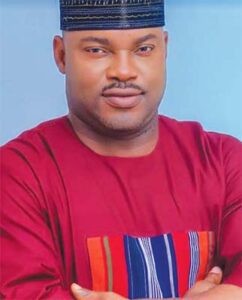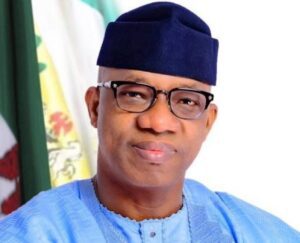Our approach to infrastructural development is result-oriented — Prof. Daud Sangodoyin
The Oyo State Government has been investing heavily on infrastructure development to help fuel its economic growth. Using the Alternative Project Funding Approach (APFA) which involves contractors funding projects with their own money while the state repays them over a period of time, the State has been able to achieve much development amidst the fiscal crisis bedeviling the nation. In this interview with Anu Oyeleye, Oyo State Correspondent of Nigerian NewsDirect, the Commissioner for Public Works and Transport in Oyo State, Professor Daud Kehinde Sangodoyin explains that while the government would like to address every infrastructural inadequacies in the state, the decision for the development of facilities is based on impact. The Commissioner gave an update on the strategic initiatives undertaken by the government to deliver safe and efficient transport infrastructure in the State.
What is the plan of the Seyi Makinde-admini-stration to improve rural infrastructure in Oyo State?
Firstly, I like to say that the present administration inherited some abandoned road projects from the past administration. Between October 2016 and May 2019, we found out that about 17 routes were either abandoned or terminated by the previous administration . Out of those routes, the government re-awarded nine and added ten more routes. This was done to fulfill the promises made to the people. So, these were the road that were firstly addressed.
On rural infrastructure, the government has a strategy termed rural-urban integrated. This involves that we first look at roads which would have security, economic, educational and health impact. These are the four cardinal agenda of the present administration. This initiative requires that we mainly consider roads that would boost the security system, roads that leads to major farms, roads that would serve schools and the hospitals. Since this administration is highly particular on improving productivity in the agricultural sector, we are working on roads that will enable this vision become a reality. The Moniya-Ijaiye-Iseyin road is an example of this. The road helps us to easily bring produce from villages in Oke-Ogun to the urban areas. Also if you look at the Airport-Agiya-Amuloko road, this road would also foster rural-urban integration. Development of rural infrastructure is very important but we are doing them with a focus on improving the economy of the State. Not only the farms, in Ogbomosho, We’ve completed an Under-G road which directly serves Ladoke Akintola University of Technology (LAUTECH), the stadium and the town. The project is completed, just awaiting Commissioning. If you look at the akanran area; you would see that there are some dominant farms in that area. Besides, people coming from Lagos can ply that road to Ile –ife without going to Iwo Road. In Oke- Ogun, we have projects at Saki-Ogbooro-Igboho, these are areas that have some mineral resources and farm settlements. The road being constructed at Saki Township would serve the Oke-Ogun polytechnic and help the economy in terms of buying and selling. The road also serves the Saki Teaching Hospital.
We also have the intention of constructing the Iddo-Eruwa Road, the road would have great economic impact and help us secure the area from bandits and kidnappers. This is the strategy we are using to improve road networks in Oyo State.
As a researcher, what innovation would you introduce to improve the operations of the Ministry?
My focus is on the implementation of the policies made by the State Government on transport and public works. I’ve already introduced an approach which we use to minimize bottlenecks in terms of projects award and implementation. I intend to ensure that there is a synergy among all stakeholders in public works. We are trying to ensure that the policies made by the Governor are achievable within the purview of his tenure. On implementation, I’m adopting a triangular approach which involves leveraging on the knowledge of the experts within the ministry and then proceed to those outside the Ministry, we consult external engineers, assessors who are independent and ready to criticize our projects and give evidence based data that would help the successful implementation of the projects. I consult the Nigerian Society of Engineers(NSE) while ensuring that these assessment align with the Governor’s approach to implementation of projects. As you are aware, the Governor is an engineer and has vast knowledge on many of the issues we encounter. Once I gather these views, I ensure that the timeframe also aligns and the project is approved. On smooth running of operation, I’ve introduced a 48/72 hrs rules to removing bottlenecks. I ensured that all files brought to me are sent out latest by 72hrs. It is only when my triangle approach do not align that a file stays up to 96hrs.
How do you intend to improve to state of buses,cabs, tricycle, bikes in Oyo State?
Few days ago, the Governor commissioned the Ultra-Modern Okada and Loading Points at Agodi. The Loading Points would facilitate easy transportation of residents in the state capital. This administration do not plan to ban the activities of Okada riders but that it would re-organize and coordinate them to conform with modern ways of doing transport business.
For Cabs and Buses, our vision is to have mini bus stops in major cities in Oyo State. These are different from vehicle terminals. We are working with the Transport Management Agency to fashion out the best way to achieve this. In the 70’s the minibus stops were evident in the old . The bus stops are there to pick passengers. In fact, the ones in Botswana have mobile toilets. So that if there is too much sun or rain, people can stay there and wait for the buses. Of course, we are creating this for the pace setter buses. We do not intend to follow the Lagos style, we want to do it in our unique way. At present, we have four vehicle terminals in Ibadan awaiting commissioning. One is at challenge, two at Iwo road and one at Moniya. At the terminal, there is a security post, bars and restaurant, lounge, parking spaces. People can park their cars in cases where they want to use the train, they can even sleep. We are using the Alternative Project Funding Approach (APFA) to ensure the maintenance of these facilities.
In Nigeria, many now spend over 70 percent of their income on goods and services which they were buying for less before, is there any plan by the State Government to cushion the effect of this hardship on its people?
This is where we are getting it wrong, it is better for government to teach people how to fish than giving piecemeal. I think instead of palliatives, the governments should provide jobs for the people. Not just youths but adults too. There are many adults that are not employed as well. When there is increased employment, the hardship would reduce. Oyo State Government is trying to reduce hardship by maintaining the 25th day of the month for paytment of salaries, When workers receive their pay, they inject money back to the system and the traders, those that does vocational jobs get to benefit too. The workers who collect salary can also use their funds to create informal jobs. Apart from this, the Governor is focusing on Agriculture to create more jobs in the system. As a State, there is limit to what we can do but if the Federal Government adopts our approach, you would find that there would be changes in the country.




